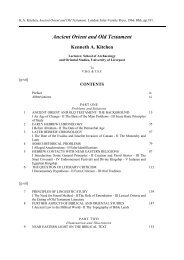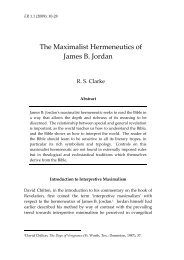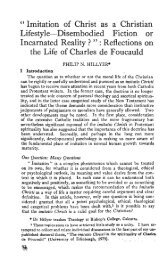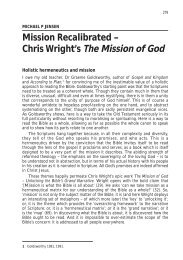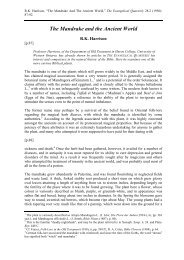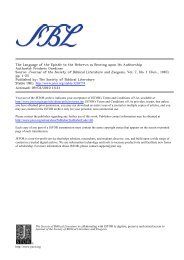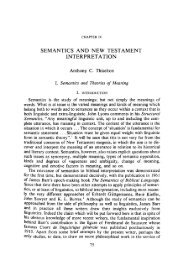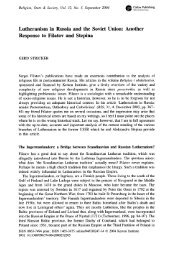"A Reformation & Revival Journal Interview with Diane Langberg ...
"A Reformation & Revival Journal Interview with Diane Langberg ...
"A Reformation & Revival Journal Interview with Diane Langberg ...
Create successful ePaper yourself
Turn your PDF publications into a flip-book with our unique Google optimized e-Paper software.
64 THE ART OF BEARING BURDENS<br />
THE ART OF BEARING BURDENS 65<br />
privilege. Peter says, lito the degree that you share the sufferings<br />
of Christ, keep on rejoicing; so that also at the revelation<br />
of his glory, you may rejoice <strong>with</strong> exultation II (1 Peter 4:13).<br />
There is a description of the sufferings of Christ in Isaiah<br />
53. We are told that<br />
he was despised and rejected by men, a man of sorrows, and<br />
acquainted <strong>with</strong> grief; and as one from whom men hid their<br />
faces, He was despised, and we esteemed him not. Surely he has<br />
borne our griefs, and carried our sorrows ... He was wounded<br />
for our transgressions, he was crushed for our iniquities ... He<br />
was oppressed and he was afflicted" (Isaiah 53:3-5,7).<br />
For us to enter into the fellowship of his sufferings is to<br />
enter into despising, abandonment, sorrow, grief, sin, oppression,<br />
violence and affliction. It is immediately clear when we<br />
hear this list, why we cannot enter in to these things <strong>with</strong>out<br />
truly knowing him and the power of his resurrection. There is<br />
no other way we could bear up under such a burden.<br />
Let us consider what we mean when we talk about bearing<br />
burdens and then move on to some more practical<br />
thoughts about how to do that. A burden is something that is<br />
carried. It suggests feeling the weight of something; it suggests<br />
fatigue or heaviness. To carry a weight requires effort, energy.<br />
To walk down the street free of weight is an entirely different<br />
experience than walking down the street shouldering a burden.<br />
I will arrive in an entirely different condition if I have<br />
borne a weight.<br />
To bear something is to carry the weight of it or to sustain<br />
it, help hold it up. To bear something also carries the meaning<br />
to give birth to. If you are moving from one house to another<br />
and you come asking me to help bear the burden of your furniture<br />
that will mean I expend effort, feel fatigue, help shoulder<br />
the load. The result will be that your load is less heavy.<br />
You will expend less energy and feel less fatigue. It also means<br />
that together we will give birth to something-you will end<br />
up in a different place, a new place. What a picture that is of<br />
burden bearing!<br />
In order for you and I to be effective burden bearers, burdens<br />
must be both known and borne. liThe Word became<br />
flesh and dwelt among us" (John 1:14). "Surely he has borne<br />
our griefs, and carried our sorrows" (Isaiah 53:4). What is<br />
required of us if we are to know another's burden? The first<br />
thing we must give is time. You cannot know another's experience<br />
<strong>with</strong>out an investment of time. Time is precious commodity<br />
and most of us feel we have little enough to give anywhere.<br />
However, you cannot shoulder another's burden <strong>with</strong><br />
them <strong>with</strong>out a time commitment. I will have to be willing to<br />
give you some of my time ifI am to walk <strong>with</strong> you and carry a<br />
load <strong>with</strong> you. It also means that the time I give to you is<br />
largely time to be used at your pace. If you are carrying a burden<br />
and I come alongside to help, I will be a hindrance ifI am<br />
proceeding at twice the pace. How hard it is for us to allow<br />
another to determine our pace. How hard it is to wait while<br />
they struggle to articulate what the problem is. It is hard to<br />
wait for them to be able to hear things we think are important<br />
to say, and it is hard to manifest the patience and faithfulness<br />
of God when another's pace is about one-quarter of ours.<br />
A second thing that is required if we are to know another's<br />
burden is listening. God has continually taken into account<br />
who we are as creatures. He remembers that we are dust. He<br />
listens to our prayers, spoken and unspoken. How often in<br />
wanting to help others <strong>with</strong> their burdens we fail to take who<br />
they are into account. How often we fail to listen. We speak<br />
before we hear, which Scripture says is foolish. We hear a little<br />
bit and assume we understand. The m~ghty God of the universe,<br />
the one who knows all things, became like us so that<br />
when he says, "I know," we can be certain that indeed he does.<br />
Yet how little we allow others the respect and space to teach us<br />
about themselves. When someone says they are terrified,<br />
depressed, crushed, or abused, how rarely we stop and say,<br />
"Teach me what that means. What is that like for you?" We<br />
assume we know, and often assume we know the remedy as<br />
well.<br />
A third thing required if burdens are to be known is<br />
endurance. To give of one's time, to truly listen to others




